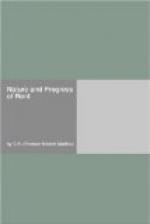The high or low price of provisions, therefore, in any country is evidently a most uncertain criterion of the state of the poor in that country. Their condition obviously depends upon other more powerful causes; and it is probably true, that it is as frequently good. or perhaps more frequently so, in countries where corn is high, than where it is low.
At the same time it should be observed, that the high price of corn, occasioned by the difficulty of procuring it, may be considered as the ultimate check to the indefinite progress of a country in wealth and population. And, although the actual progress of countries be subject to great variations in their rate of movement, both from external and internal causes, and it would be rash to say that a state which is well peopled and proceeding rather slowly at present, may not proceed rapidly forty years hence; yet it must be owned, that the chances of a future rapid progress are diminished by the high prices of corn and labour, compared with other countries.
It is, therefore, of great importance, that these prices should be increased as little as possible artificially, that is, by taxation. But every tax which falls upon agricultural capital tends to check the application of such capital, to the bringing of fresh land under cultivation, and the improvement of the old. It was shown, in a former part of this inquiry, that before such application of capital could take place, the price of produce, compared with the instruments of production, must rise sufficiently to pay the farmer. But, if the increasing difficulties to be overcome are aggravated by taxation, it is necessary, that before the proposed improvements are undertaken, the price should rise sufficiently, not only to pay the farmer, but also the government. And every tax, which falls on agricultural capital, either prevents a proposed improvement, or causes it to be purchased at a higher price.
When new leases are let, these taxes are generally thrown off upon the landlord. The farmer so makes his bargain, or ought so to make it, as to leave himself, after every expense has been paid, the average profits of agricultural stock in the actual circumstances of the country, whatever they may be, and in whatever manner they may have been affected by taxes, particularly by so general a one as the property tax. The farmer, therefore, by paying a less rent to his landlord on the renewal of his lease, is relieved from any peculiar pressure, and may go on in the common routine of cultivation with the common profits. But his encouragement to lay out fresh capital in improvements is by no means restored by his new bargain. This encouragement must depend, both with regard to the farmer and the landlord himself, exclusively on the price of produce, compared with the price of the instruments of production; and, if the price of these instruments have been raised by taxation, no diminution of rent can give relief. It is, in fact, a question, in which rent is not concerned. And, with a view to progressive improvements, it may be safely asserted, that the total abolition of rents would be less effectual than the removal of taxes which fall upon agricultural capital.




